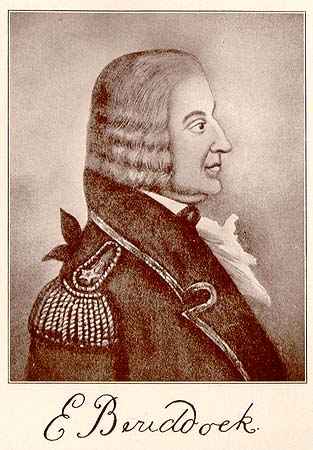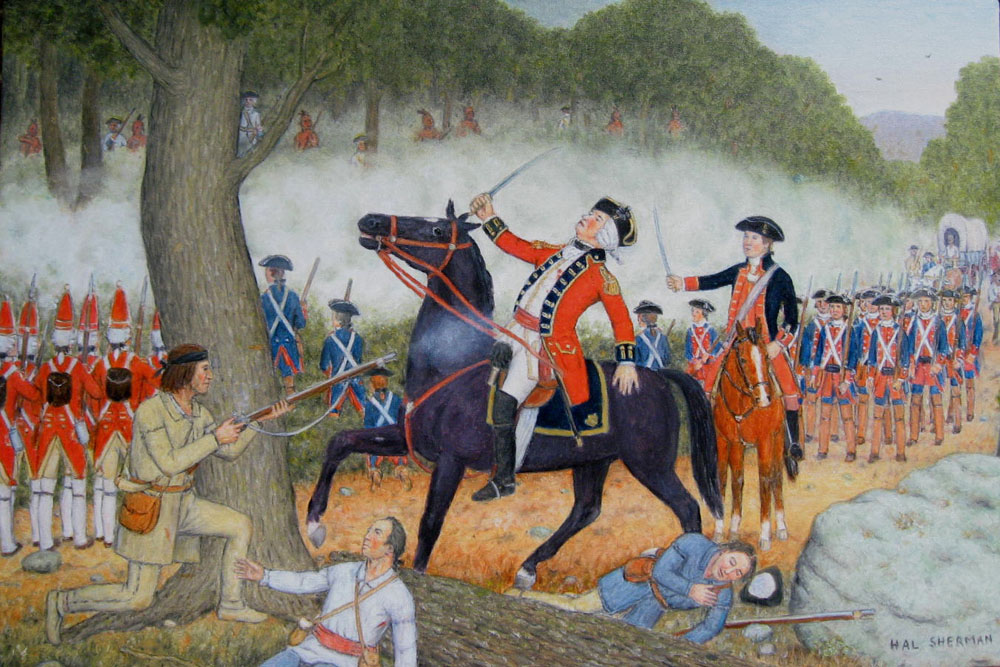
|
|
|
|
Gen. Braddock was a brave man, and had enjoyed much experience in
military life; but he was naturally haughty, imperious, and
self-complacent. disdaining to receive counsel from his subordination,
and what was less excusable in a general, despising his enemy. These
peculiarities of his personal character were undoubtedly the cause of
losing his army, and his own life. While on his march, Col. Croghan,
from Pennsylvania, a distinguished frontier-man, with a hundred
Indians, offered his services to aid the expedition by scouring the
forest in advance of the army and bringing intelligence of the enemy's
movements. Washington, with his peculiar modesty and courtesy, advised
him to accept their aid; his advice was apparently listened to; but the
Indians were treated so coolly that they withdrew in disgust. Braddock
not only despised Indians, but all Indian modes of fighting; denouncing
the habit of the provincial troops of fighting Indians from behind
trees, and insisting upon their coming out upon the open field, "like
Englishmen." The provincial troops were no dastards; and could they
with their favorite champion, have had their own way, the fortunes of
that fatal day would have been changed. After Braddock fell, the retreating soldiers carried their wounded general for four days, until they reached seven miles beyond Dunbar's Camp, where he expired. He was buried in the center of the road which his advancing army had cut; and to prevent the discovery of the grave, and to save the body from savage dishonor, soldiers, horses and wagons passed over it. Some of the soldiers so marked the trees near the spot, that those who visited the west many years after could point it out with certainty. It is near a small run, a few rods north of the national road, between the 53d and 54th mile from Cumberland, and a little west of the Braddock's run tavern, kept by Mr. R. Shaw. The present national road deviates from Braddock's road near Mr. Shaw's and crosses Laurel hill by a more southerly route. Before this was located, the old road was the great thoroughfare between the Monongahela settlements and Baltimore. Some twenty years since, while a party of laborers were repairing the old road, the digging away the slope of the hill, they disinterred some bones, with sundry military trappings, which were at once known by old settlers to be those of Braddock. One and another took several of the most prominent bones, and the others were reinterred under the tree on the hill, near the national road. Mr. Stewart of Uniontown, (father of the Hon. Andrew Stewart,) afterwards collected the scattered bones from the individuals who ha taken them, and sent them, it is believed, to Peale's museum in Philadelphia. A plain shingle, marked "Braddock's Grave," nailed to the tree where a part of the bones were reinterred, is the only monument to point out to the traveler the resting-place of the proud and brave but unfortunate Braddock. Thus we see the truthfulness of the proverb verified, that, pride goeth before destruction, and a haughty spirit before a fall." There had long existed a tradition in the region that Braddock was killed by one of his own men, and more recent developments leave little or no doubt of the fact. A recent writer in the National Intelligencer, whose authority is good on such points, says: "When my father was removing with his family to the west, one of the Fausetts kept a public house to the eastward from, and near where Uniontown now stands, as the county seat of Fayette, Pa. This man's house we lodged in about the 10th of October, 1781, twenty six years and a few months after Braddock's defeat, and there it was made anything but a secret, that one of the family dealt the death blow to the British general. Thirteen years afterwards I met Thomas Fausett in Fayette Co., then, as he told me, in his 70th year. To him I put the plain question, and received the plain reply, "I did shoot him." He then went on to insist, that, by doing so, he contributed to save what was left of the army. In brief, in my youth I never heard the fact either doubted or blamed, that Fausett shot Braddock. Hon. Andrew Stewart says he knew, and often conversed with Tom Fausett, who did not hesitate to avow in the presence of his friends that he shot Gen. Braddock. Fausett was a man of gigantic frame, of uncivilized half-savage propensities, and spent most of his life among the mountains as a hermit, living on game which he killed. He would occasionally come into town and get drunk. Sometimes he would repel inquiries into the affair of Braddock's death by putting his fingers to his lips, and uttering a sort of buzzing sound; at other he would burst into tears, and appear agitated by conflicting passions. In spite of Braddock's silly order that the troops should not protect themselves behind the trees, Joseph Fausett had taken such a position, when Braddock rode up in a passion, and struck him down with his sword. Tom Fausett, who was but a short distance from his brother, saw the whole transaction, and immediately drew up his rifle and shot Braddock through the lungs, partly in revenge for the outrage upon his brother; and partly, as he always alleged, to get the general out of the way, and thus save the remainder of the gallant band who had been sacrificed to his obstinacy and want of experience in frontier warfare. |

••••• Tom Fausett killing General Braddock •••••
Painting courtesy of the artist, Hal Sherman
http://shawnee-bluejacket.com/gallery.htm
|
Offered December 2001 |
ANOTHER LOOK
Excerpts from The Allegheny |
|
|
||
| previous page |
|
|
|
|
||